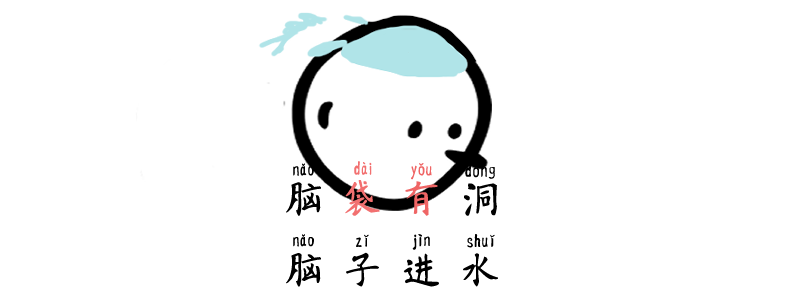脑袋有洞 nǎodài yǒudòng (Taiwan)
VO. (Literal meaning is “having a hole in one’s head”)
It’s used to describe someone who is being foolish, stupid, or absent-minded. The slang suggests that the person’s brain has a hole, which makes them unable to think clearly or logically. It’s often used in a joking or lighthearted way to tease someone who has done something silly or made a mistake. However, it can also be used in a more serious tone to criticize someone’s behavior or decision-making skills.
你把電視遙控器冰在冰箱裡是腦袋有洞嗎?你把电视遥控器冰在冰箱里是脑袋有洞吗?
Do you have a screw loose for putting the TV remote in the fridge?
市長決定要提高窮人的稅來幫助富人,真的是腦袋不知道有幾個洞市长决定要提高穷人的税来帮助富人,真的是脑袋不知道有几个洞
The mayor’s decision to increase taxes for the poor to help the rich is really brainless.
我怎麼可能喜歡他,你是腦袋有洞嗎?我怎么可能喜欢他,你是脑袋有洞吗?
How could I possibly like him? Are you out of your mind?
脑子进水 nǎozi jìnshuǐ (China)
VO. (Literal meaning is “fill the water in one’s head”)
那個公司領導做事不想後果,腦子肯定進水了那个公司领导做事不想后果,脑子肯定进水了
That company leader acts without considering the consequences. His brain must be filled with water.
你怎麼會相信他的話?你的腦子進水了嗎?你怎么会相信他的话?你的脑子进水了吗?
How could you believe him? Is your brain filled with water or something?
他一定是腦子進水才敢在網路上說領導的壞話他一定是脑子进水才敢在网络上说领导的坏话
He must have water in his brain to dare to say bad things about his leader on the internet.
Conversation
A: 我沒有護照怎麼辦?我没有护照怎么办?
I don’t have a passport, what can I do?
B: 你要護照做什麼?你要护照做什么?
What do you want the passport for?
A: 明天不是要去紐約嗎?明天不是要去纽约吗?
Aren’t you going to New York tomorrow?
B: 我們的班機是從加州出發又不是從加拿大出發我们的班机是从加州出发又不是从加拿大出发
Our flight is from California and not from Canada.
A: 可是我們坐飛機去,坐飛機就要有護照可是我们坐飞机去,坐飞机就要有护照
But we go by plane, so we need a passport to fly
B: 我建議你最近都不要低頭比較好我建议你最近都不要低头比较好
I suggest you not to bow your head recently.
A: 為什麼?为什么?
Why?
B: 因為水會流出來…因为水会流出来…
Because the water will come out…
정신나갔구나, 미쳤어
我真的覺得那女生腦袋有洞,怎麼能每天4點起床運動我真的觉得那女生脑袋有洞,怎么能每天4点起床运动
난 정말로 그녀가 정신나갔다고 생각해. 매일 밤 4시에 일어나서 운동하고 있잖아.
你腦袋有洞嗎?怎麼可以做那麼危險的事你脑袋有洞吗?怎么可以做那么危险的事
미쳤어? 어떻게 그렇게 위험한 짓을 할 수 있어?
いかれポンチ
你是腦袋有洞嗎!你是脑袋有洞吗!
お前いかれポンチかよ!
跟腦袋有洞的人一起工作超累跟脑袋有洞的人一起工作超累
いかれポンチな人とは一緒に仕事するのはつらい。


